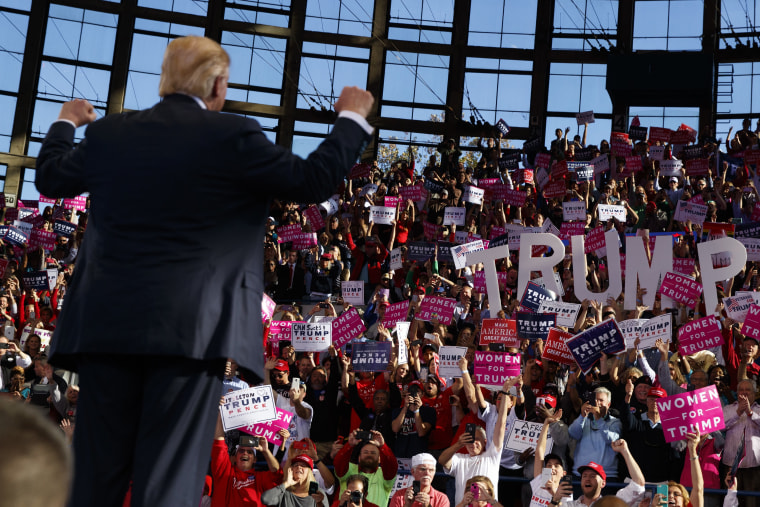Plenty of presidents have left the confines of the White House, hit the road, and promoted major priorities in the hopes of rallying public support. Woodrow Wilson, for example, embarked on a tour in 1919 to help promote the League of Nations. More recently, George W. Bush held a series of events to sell Americans on the idea of Social Security privatization, which didn't turn out well, while Barack Obama did the same in support of health care reform, which succeeded.
Donald Trump, true to form, has approached his office quite differently. Before his inauguration, and several times since, this president has organized rallies, not to promote parts of his agenda, but in order to celebrate himself.
With this in mind, today is an unusual, and arguably quite important, day in Trump's presidency: it's the first time he's hosting a major public event in support of a policy priority. The Republican is headed to Missouri, where he hopes to rally Americans behind the idea of a sweeping overhaul of the nation's tax laws.
Politico noted, however, that Trump "is not expected to go into much detail" today in the Show Me State. That's to be expected given the president's general disinterest in the substance of governing, but in this case, it's not really optional: Trump can't go into detail on the plan's specifics because, as Bloomberg Politics reported this week, the plan doesn't actually exist.
President Donald Trump is planning to kick off one of the most important sales pitches of his presidency this week -- getting Americans fired up about rewriting the U.S. tax code.But there's no plan to sell. Basic questions remain unanswered. Will the changes be permanent or temporary? How will individual tax brackets be set? What rate will corporations and small businesses pay?Instead of providing details that could help build support for a bill, the president will largely rely on the same talking points he and his advisers have highlighted since January: The middle class deserves a tax cut and businesses need changes to help them compete with global rivals.
And while "the same talking points" have appeal for the White House, Republicans have a painfully obvious problem: they know they want to tackle tax reform, but they have no idea how.
Henrietta Treyz, a tax analyst with Veda Partners and former Senate tax staffer, told Bloomberg Politics, in reference to Republican policymakers, "They're nowhere. They're just nowhere. I see them putting these ideas out as though they're making progress, but they are the same regurgitated ideas we've been talking about for 20 years that have never gotten past the white-paper stage."
We have some sense of the kinds of measures GOP officials will pursue, but it's tough to rally the public behind vague Republican ideas about giving tax breaks to the wealthy.
Postscript: As we discussed last week, the recent trajectory of the debate on tax reform has been something of a fiasco for Trump. Not long after taking office, Treasury Secretary Steven Mnuchin assured Americans that tax reform would pass by August. That obviously didn’t happen. Later, White House Legislative Affairs Director Marc Short said the administration’s tax plan wouldn’t pass by August, but before September, the blueprint would be “locked in place.” That obviously didn’t happen, either.
The White House’s plan then changed a bit more: Trump would spend August selling the public on the virtues of his tax reform plan, before unveiling the “full blown” presidential blueprint after Labor Day. The White House recently gave up altogether on the idea of unveiling a plan, leaving it to Congress and the "Big Six" -- Paul Ryan, Mitch McConnell, Kevin Brady, Orrin Hatch, Gary Cohn, and Mnuchin -- to figure something out.
